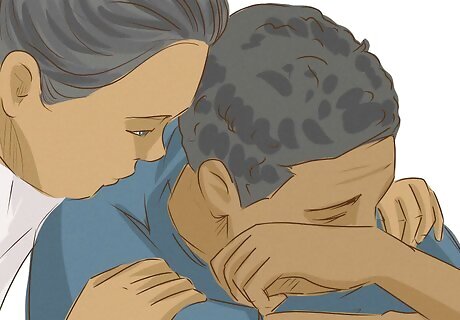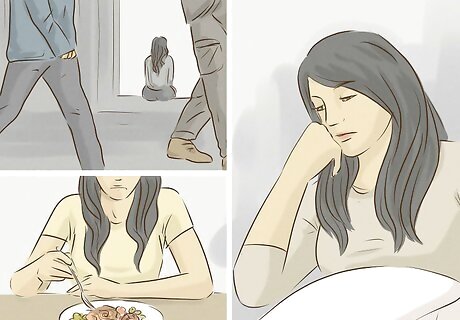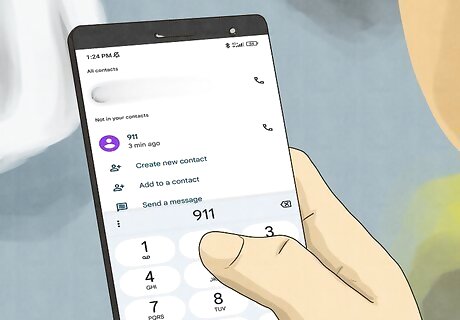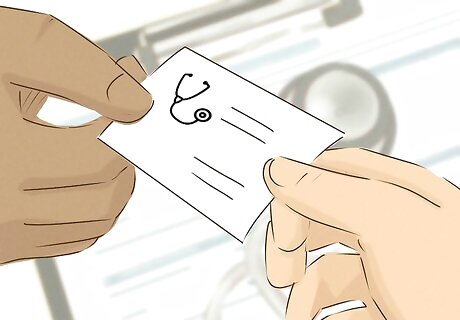
views
X
Research source
As a friend, you can potentially save a life by paying attention to warning signs of suicide (in addition to the ones you already know about), making your friend feel supported, and knowing when and how to get outside help. If your friend is in immediate danger call 911, or 988 to talk to professionals and access necessary resources.
Recognizing the Signs

Spot patterns of suicidal thought. The most important part of prevention is recognition of warning signs. Suicidal thoughts usually include two or more of the following patterns: Frequent dwelling on a thought obsessively Believing that there is no hope, and no way to end the pain other than committing suicide. Viewing life as meaningless, or out of control. Feeling as though one's brain is in a fog that makes concentration difficult

Recognize suicidal emotions. Many emotional changes accompany suicidal thought, and the following changes are common warning signs: Extreme mood swings Feelings of loneliness and isolation, even in the presence of others Feelings of worthlessness, shame, guilt, self-hatred, and the sense that no one cares. Becoming sad, withdrawn, tired, apathetic, anxious, irritable, or prone to angry outbursts.

Watch for suggestive comments. Be alert to statements that echo the patterns of thoughts and feelings that accompany suicidality. The following are common to hear from a suicidal person: "Life isn’t worth living." "You (or another friend or family member) would be better off without me." "Don’t worry, I won’t be around to deal with that." "You’ll be sorry when I’m gone." "I won’t be in your way much longer." "I just can’t deal with everything — what's the point?" "I won’t be a burden much longer." "There’s nothing I can do to change anything." "I’d be better off dead." "I feel like there is no way out." "I never should have been born".

Be wary of sudden improvement in mood. Many people who go through with suicide do so when they appear to be feeling significantly better than they have been. You may be seeing the peaceful resoluteness of making the decision to end their life, and should take preventative steps immediately.

Notice unusual behavior. You can observe many behavioral changes in suicidal individuals. If you see at least a few of the following, you may have cause for concern.: Declining performance in school, work, or other activities (or occasionally the opposite, filling up time with extra duties and responsibilities) Social isolation Little or no interest in sex, friends, or previously enjoyable activities Carelessness about personal welfare and deteriorating physical appearance Alterations in either direction in sleeping or eating habits. Look for extremes like self-starvation, poor dietary management, or inattention to medical orders (especially in the elderly) Drastic changes to established routines. Lethargy and withdrawal.

Recognize signs of suicide planning. Having a plan already in place can mean that a successful attempt could happen soon. Watch for all of the following actions: Tying up loose ends (e.g. saying goodbye to loved ones, giving away valuable belongings, arranging finances) Making reckless or passive decisions about important things Gathering the means to commit suicide, like pill bottles, medications, and weapons
Talking to your Suicidal Friend

Set a comfortable scene. Talking about possible suicide can be a very tense subject, especially for your friend who may also have feelings of guilt and shame associated with their suffering. Initiate a conversation without the presence of distractions. Choose a relaxed and familiar environment if possible.

Broach the issue of suicide. The following are good questions that you can use to start the conversation: "How are you coping with what's been happening in your life?" "Do you ever feel like just giving up?" "Do you think often about dying?" "Are you considering hurting yourself?" "Are you thinking about suicide?" "Have you ever tried to harm yourself before?"

Speak clearly and openly. Be as specific as possible to avoid sounding accusatory. For example, instead of saying something like "You always talk about how impossible everything is", try detailed observations like "I have noticed in the past few months that things you used to enjoy, like spending time with your kids, does not seem to improve your mood much." Openly embrace the topic as another way to show how much you care. If you are direct about your concern, you will give off a sense of a justified sense of urgency. It is a common myth that bringing up suicide will put the idea into a person's mind. In fact, speaking openly about suicide can help your friend realize that there are other options available. Stay on topic as best you can. Your friend might try to dismiss your concern by looking at you with confusion or making you feel silly for bringing it up. But, don't be afraid to be persistent in your concern--especially in light of recognizing warning signs.

Avoid stigmatizing suicide. Keep an open mind that does not judge the friend’s feelings or decisions. You may think your friend is incorrect in their reasoning or that their situation is not bad enough that they should want to commit suicide. However, understand that you can’t fully understand. The belief that suicide is selfish, crazy, or morally defective is widely circulated in our culture. Be aware that suicidality is the result of a treatable condition for which your friend is not at fault.

Stay away from statements that can hurt. It's easy to think that we can help by offering our perspectives or opinion, but this isn't always the case. Be sure to avoid the following responses: Statements that dismiss feelings, like "things aren't really that bad." Superficial comments that prompt feelings of shame and isolation, like “you have so much to live for,” or “think about how much your suicide will hurt your family and friends.” Instead, show compassion by saying, “things must really be awful if you are feeling that way.”

Listen empathically. Let your talk be an opportunity for your friend to feel loved and supported. Try as best you can to non-judgmentally listen to your friend, putting yourself in their shoes. This will help you accept their feelings with warm, personal understanding. Make eye contact and use body language to show that you are really there to listen. Let them talk for as long as they need. Even if you can think of many words of encouragement or reasons why they should cheer up, hold off. Create space for your friend to express themselves without cutting in to give your own opinion. Validate feelings. It can be hard to come out and express feelings that you don’t expect others to understand. Make your friend feel less alone by showing understanding and affirmation of these feelings.

Relay how much you care. Emotional support is a powerful suicide deterrent. Let your friend know that they are loved, thought about, and is an important part of your life. Project an attitude of respect and love to your friend throughout the conversation. This is your opportunity to tell your friend your perspective. Mention that suicide is a permanent solution to a solvable problem and that you and others are more than willing to help realize other possibilities.
Preventing a Friend's Suicide

Ask about means for self-harm. See if your friend has access to weapons or other methods for taking their life. Try to ask without sounding patronizing or judgmental. This is an important question, since having a plan means the situation may be even more pressing than you may have believed.

Eliminate potential means. All guns should be removed from your friend's home. Using a gun is the most common method of suicide, and attempts are more likely to lead to deaths in homes with guns. Also, be sure to throw out all prescription and nonprescription medicines that are not currently being used. If your friend is taking prescription medication, you may want to offer to keep it for them and give doses as needed.

Request to be actively involved. Make an agreement with your friend that they will inform you if they are tempted to move forward with the act. Inform them of the actions you will take to carry out your part of the agreement, like calling for professional help. Absolutely do not make any commitments to your suicidal friend that you cannot keep for certain. Before doing this, ask yourself about the reality of how much you can manage to get involved, knowing that involvement can be a drain on emotions and time.

Help gather resources. Know about support groups in the area, as well as information that will help you get a better sense of what drives people to suicide so that you can be as supportive as possible. There are many support groups available online and in-person. Search for groups that address various problems that can contribute to suicidal feelings and provide information about other resources.

Be attentive. If your friend is at high, immediate risk for suicide, do not leave them alone until professional help arrives. Make sure that you or someone else stays with them at all times.

Offer ongoing support. This can include time to talk and check in on how your friend is feeling or devoting more time to shared hobbies and activities. This sort of support will help your friend feel important to someone while they are recovering from the depression that causes suicidal thoughts.
Soliciting Outside Help

Call the emergency services. If your concern for your friend is immediate, do not hesitate to call the emergency services. Do not try to handle suicide threats on your own, and absolutely do not assume that a friend talking about harming themselves is not serious.

Call a suicide hotline.A suicidal person needs immediate assistance from qualified mental health professionals. Again, if you are in America, call 911 or 988 to avoid the need for you or other untrained individuals to act as the sole counselors to your friend.

Suggest therapy. Having regular sessions with a therapist about suicidal thoughts, feelings, and what triggers them can help prevent suicide attempts in depressed individuals. And, for those who have already attempted suicide, talk therapy can reduce risks of subsequent attempts by up to 50%.

Inform others on a need-to-know basis. Enlist the help of other important people in your friend's life. If others are aware of the problem they will be able to be sensitive and stay on the lookout for warning signs. Make sure you only inform others of your friend's risk for suicide if you think they are capable of helping.

Make sure you’re coping, too. Playing a helping role in such a serious matter can be exhausting, stressful, and also frustrating. Make an effort to ensure that your own physical and emotional needs are being met. Talking about your feelings to people you trust will help you process the situation and understand your experience.

















Comments
0 comment